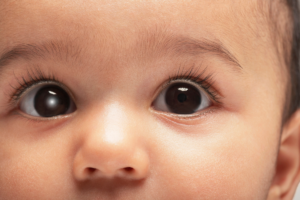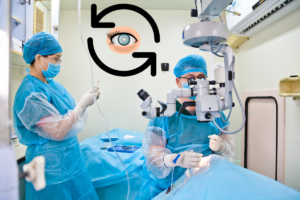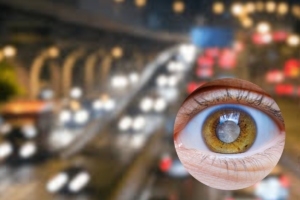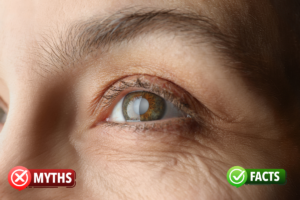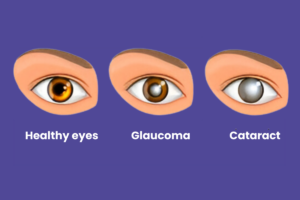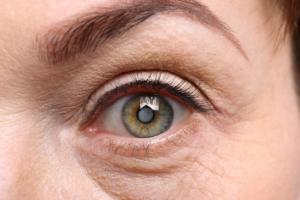Can cataracts cause blindness?

Cataracts are one of the most common causes of vision impairment, particularly in older adults. They occur when the natural lens of the eye becomes cloudy, which can lead to blurry or dimmed vision. While cataracts are treatable with surgery, many people wonder whether they can progress to complete blindness if left untreated. In this blog, we will explore how cataracts affect vision, how long it takes for them to cause blindness, and what you can do to prevent or reverse cataract-related blindness.
How do cataracts affect vision?

Cataracts develop slowly over time. They begin as small cloudiness in the lens of the eye but can gradually expand and interfere with light entering the eye, affecting the retina. The symptoms caused by cataracts can vary depending on the severity and type of cataract. Common vision problems that cataracts can cause include:
- Blurred or Dim vision: The cloudiness of the lens obstructs light from passing through clearly, resulting in blurred or dull vision.
- Increased sensitivity to glare: Bright lights, such as headlights at night or sunlight, may cause glare, making it difficult to see clearly in well-lit environments.
- Double vision: Sometimes cataracts can cause images to overlap, leading to double vision.
- Difficulty with night vision: Cataracts make it harder to see in low-light situations, such as when driving at night.
- Frequent changes in eyeglass prescription: As cataracts worsen, patients may need frequent changes to their glasses to compensate for their declining vision.
Initially, these symptoms might be mild, but as the cataract progresses, it can severely impair vision. Eventually, untreated cataracts can result in blindness if left unaddressed.
Can cataracts lead to blindness?
Cataracts themselves don’t typically cause sudden or total blindness, but they can significantly impair vision. The danger arises when cataracts are left untreated, as they can continue to progress, leading to further complications:
- Severe vision impairment: As the cataract matures, the lens becomes more opaque, and light cannot pass through effectively, leading to severe vision loss.
- Complications from advanced cataracts: If left untreated for an extended period, advanced cataracts can increase the risk of other serious eye conditions such as glaucoma or retinal detachment, which can cause irreversible blindness.
- Complete vision loss: In rare cases, cataracts can become “hyper-mature” or “mature,” where the lens becomes completely cloudy and hard. This condition can block light from entering the eye, leading to total blindness.
However, blindness from cataracts is rare because cataracts are treatable with surgery, and most people seek medical attention before they reach this stage.
How long does it take for cataracts to cause blindness?
Cataracts do not cause blindness overnight. The timeline for cataract progression can vary widely depending on factors such as the type of cataract, overall health, and whether the condition is being managed. On average, untreated cataracts can take several years to reach a stage where they severely impair vision. However, in some cases, cataracts can progress rapidly within a year or two.
Factors affecting cataract progression include:
- Type of Cataract: There are different types of cataracts, such as nuclear, cortical, and posterior subcapsular cataracts. Some types, such as posterior subcapsular cataracts, can develop more quickly and cause vision impairment sooner than others.
- Underlying health conditions: People with diabetes or other chronic conditions may experience faster cataract development. Chronic UV exposure can also accelerate cataract formation.
- Lifestyle choices: Smoking, alcohol consumption, and poor nutrition can contribute to faster cataract development.
On average, most people with cataracts will experience noticeable vision changes after a few years, but it is rare for cataracts to cause complete blindness without timely treatment.
Recognizing when cataract surgery is needed
Cataract surgery is the only effective treatment for cataracts. The surgery involves removing the cloudy lens and replacing it with a clear, artificial lens. It’s important to recognize the signs that indicate when cataract surgery is necessary:
- Decreased visual clarity: If cataracts start interfering with daily activities like reading, driving, or recognizing faces, it’s time to consider surgery.
- Increased sensitivity to light or glare: Cataracts can cause discomfort in bright light, making it hard to drive at night or go outside in the sunlight.
- Frequent eyeglass prescription changes: Cataracts cause the lens to change shape, which may require frequent changes in prescription lenses.
- Vision that is not improved with glasses: If vision problems are no longer resolved with eyeglasses or contact lenses, cataract surgery should be considered.
The best course of action is to have a consultation with an ophthalmologist. Waiting too long to address cataracts can make the surgery more complicated, and the risk of complications increases.
Can cataracts cause sudden blindness?
While cataracts themselves generally do not cause sudden blindness, certain complications related to cataracts can lead to rapid vision loss. Some of the conditions that may arise as cataracts progress include:

- Acute angle-closure glaucoma: In some cases, advanced cataracts can cause increased pressure inside the eye, leading to a condition called angle-closure glaucoma. This is a medical emergency that can cause sudden vision loss.

- Retinal detachment: In rare cases, untreated cataracts can increase the risk of retinal detachment, where the retina pulls away from the back of the eye. This can lead to permanent vision loss if not treated immediately.

- Traumatic cataracts: Eye injuries can cause cataracts to develop rapidly, sometimes leading to sudden vision changes or even blindness if left untreated.
If you experience sudden vision changes or eye pain, it’s essential to consult an ophthalmologist immediately.
Preventing blindness from cataracts
Preventing blindness from cataracts is largely possible with early detection and treatment. There are several steps you can take to delay or prevent cataract progression:
1. Regular eye exams

One of the most important steps in preventing cataracts from progressing to blindness is having regular eye exams, especially for individuals over 40 or those with a family history of cataracts. Early detection allows for monitoring and timely intervention.
2. Protect your eyes from UV rays

Long-term exposure to ultraviolet (UV) rays from the sun can accelerate cataract formation. Wearing sunglasses with UV protection and a wide-brimmed hat can help reduce this risk.
3. Maintain a healthy diet

Eating a diet rich in antioxidants (such as vitamins C and E) can help prevent cataract development. Foods like leafy green vegetables, fruits, and nuts are beneficial for eye health.
4. Avoid smoking & Limit alcohol

Smoking and excessive alcohol consumption are known to increase the risk of cataracts. Quitting smoking and moderating alcohol intake can significantly lower your risk.
5. Manage health conditions

Controlling underlying conditions like diabetes and high blood pressure can help prevent rapid cataract formation and other complications.
Is blindness from cataracts reversible?
The great news about cataracts is that blindness caused by cataracts is almost always reversible with surgery. Cataract surgery involves removing the cloudy lens and replacing it with an artificial intraocular lens (IOL), restoring vision in most cases.
The procedure is minimally invasive and has a high success rate. Most patients experience significant improvements in vision within a few days after surgery. The recovery period is relatively short, with most people returning to normal activities in a few weeks.
Living with cataracts before surgery
If you’re waiting for cataract surgery, there are ways to manage the vision impairment in the meantime:
- Magnify text or images: Using magnifying glasses, reading aids, or larger fonts can help with daily activities.
- Increase lighting: Ensuring good lighting in your home or workplace can reduce the strain on your eyes.
- Avoid driving at night: Cataracts can impair your ability to see clearly in low-light conditions, so it’s advisable to avoid night driving until you’ve had surgery.
By making these adjustments, you can still manage the symptoms and maintain some level of independence before surgery.
Key takeaways
- Cataracts can lead to significant vision loss, but they are largely preventable with early detection and treatment.
- Cataracts develop slowly, but neglecting them can result in serious complications such as glaucoma or retinal detachment, which can cause blindness.
- Regular eye exams, a healthy lifestyle, and timely cataract surgery can prevent blindness caused by cataracts.
- Cataract surgery is safe, effective, and can restore vision even in advanced stages.
Conclusion
Cataracts are a common condition that can cause vision impairment, but they don’t have to lead to blindness. With early intervention, cataract surgery can restore vision and prevent further complications. If you notice any changes in your vision, consult an ophthalmologist to determine the best course of action. Early diagnosis and treatment are key to preserving your eyesight and preventing blindness caused by cataracts.
Concerned about cataracts or experiencing vision changes? Book a consultation with Krisha Eye Hospital in Ahmedabad.
Author bio
Dr. Dhwani Maheshwari, an esteemed ophthalmologist with over 10 years of experience, leads Krisha Eye hospital in Ahmedabad with a commitment to advanced, patient-centered eye care. Specializing in cataract and refractive surgery, Dr. Maheshwari has performed more than a thousand successful surgeries. Her expertise lies in phacoemulsification, a technique recognized for its precision in cataract treatment.
Dr. Maheshwari’s educational journey includes an MBBS from Smt. NHL MMC, a DOMS from M & J Institute of Ophthalmology, and a DNB in Ophthalmology from Mahatme Eye Bank Eye Hospital, Nagpur. She also completed a fellowship in phacoemulsification at Porecha Blindness Trust Hospital, further enhancing her surgical skills. In addition to her work at Krisha Eye Hospital, Dr. Maheshwari serves as a consultant ophthalmologist at Northstar Diagnostic Centre.
Under her leadership, Krisha Eye Hospital aims to bring all superspecialties under one roof, offering comprehensive eye care solutions for all vision needs.
FAQs
Cataracts progress at different rates for different individuals. The timeline can vary, but untreated cataracts generally take several years to significantly impair vision. Certain factors like diabetes, age, and UV exposure can accelerate progression.
The risk of blindness after cataract surgery is extremely rare. Modern cataract surgery is very safe, and the vast majority of people experience a significant improvement in vision. However, as with any surgery, there are potential risks, which your doctor will discuss with you beforehand.
Cataracts should be removed when they significantly affect your ability to perform daily activities such as reading, driving, or recognizing faces. Your ophthalmologist will determine the right time for surgery based on your symptoms and eye health.
According to the World Health Organization, cataracts impact around 65.2 million individuals globally and are responsible for moderate to severe vision impairment in more than 80% of cases.
If cataracts are left untreated, they can gradually worsen, leading to significant vision impairment. As cataracts mature, they become more opaque and block light from entering the eye, eventually leading to blindness in rare cases. Additionally, untreated cataracts may increase the risk of other eye conditions such as glaucoma.
A ruptured cataract is very rare but can occur if the cataract becomes very advanced. This condition requires immediate medical attention, as it can lead to serious complications like inflammation or infection in the eye.









